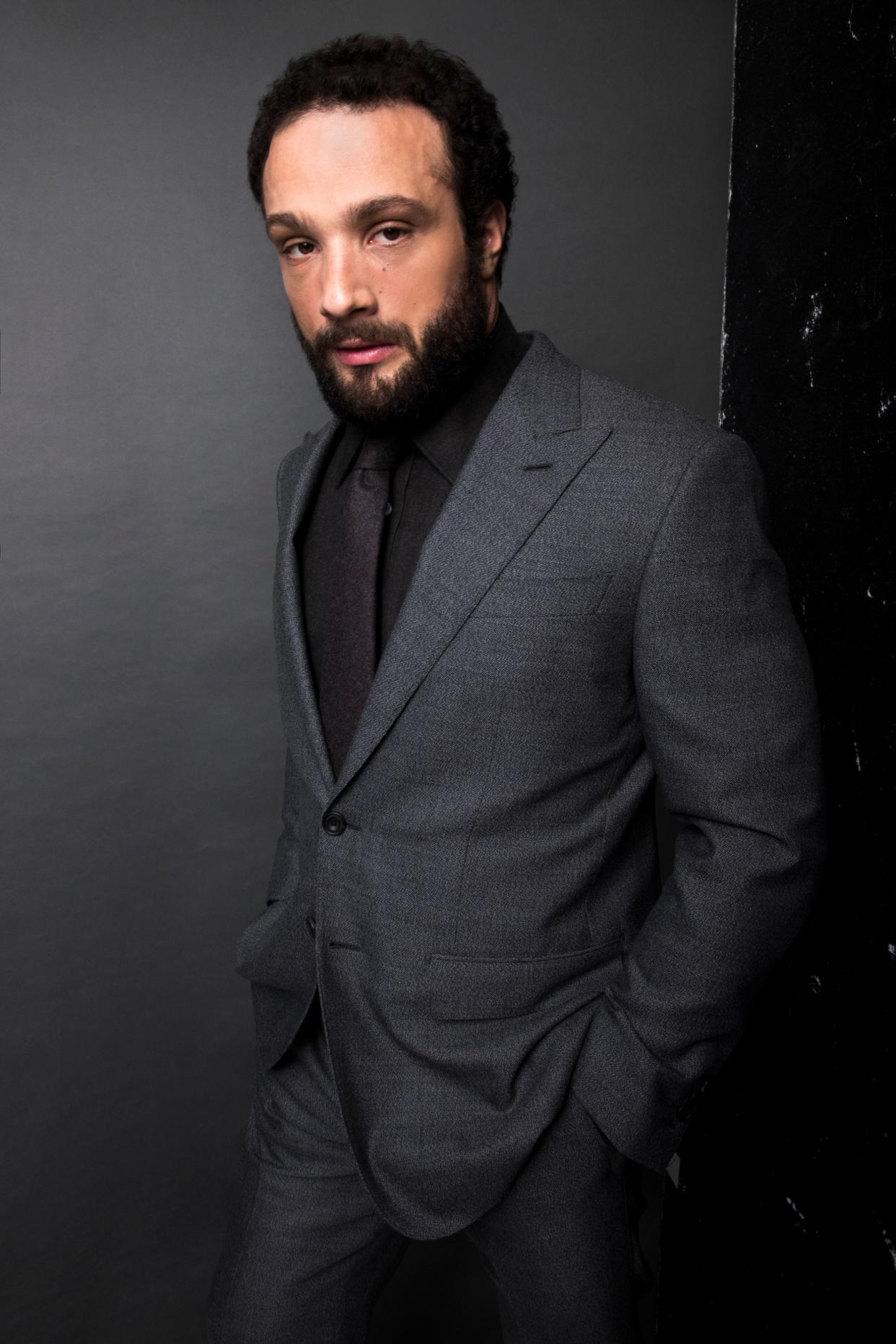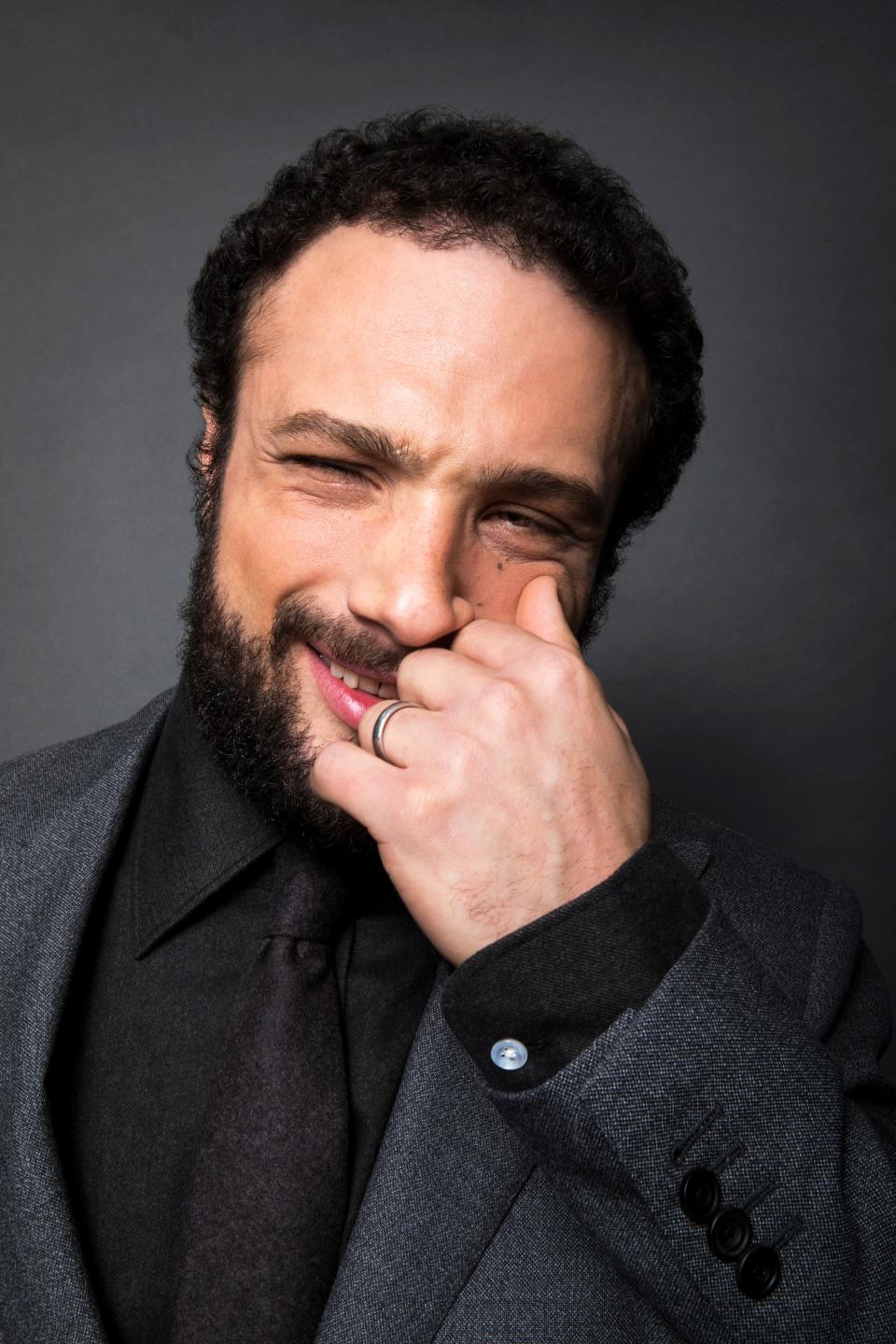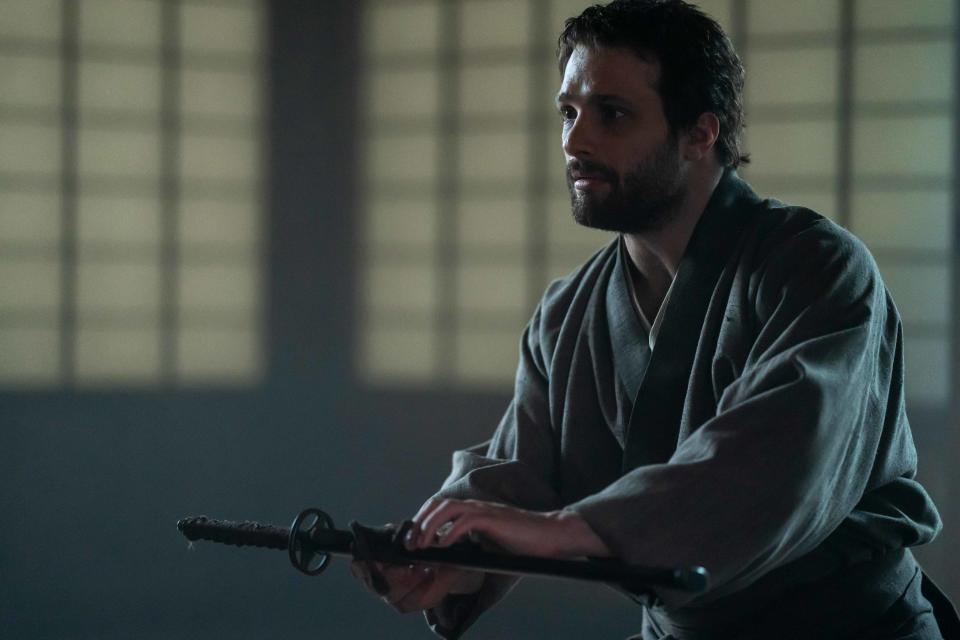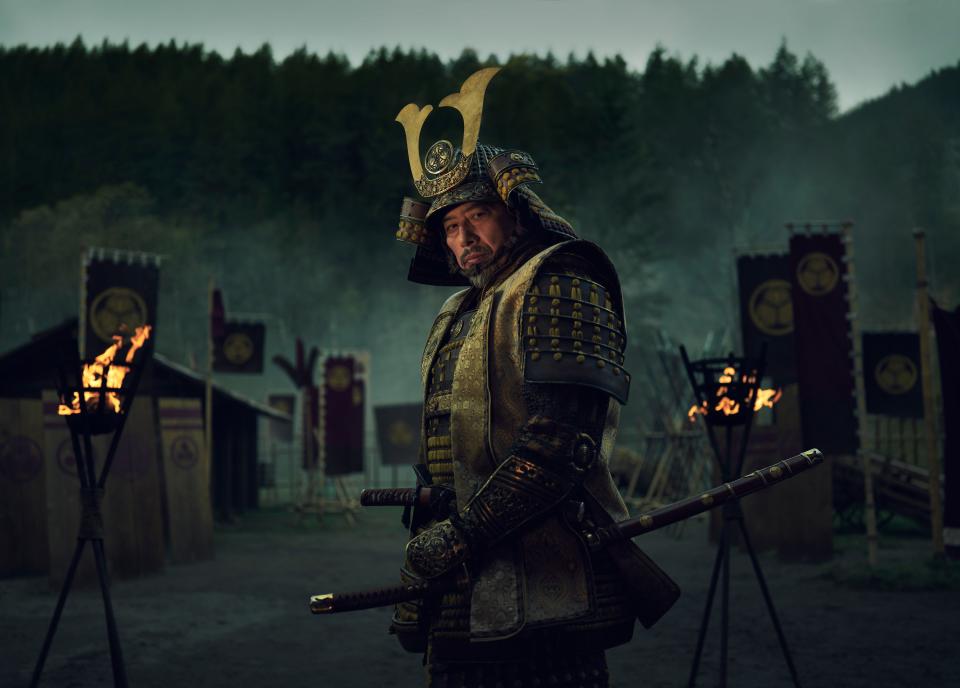Shogun 's Hatamoto, Cosmo Jarvis, on the Hit Series, That Accent, and Blackthorne’s Uncertain Future

- Oops!Something went wrong.Please try again later.
- Oops!Something went wrong.Please try again later.
Jemima Marriott
This story contains major spoilers for Chapter Eight of Shogun, “The Abyss of Life.”
In FX’s Shogun, Cosmo Jarvis sticks out. That’s to be expected playing John Blackthorne, an English sea pilot whose beleaguered ship and crew floats into a Japanese fishing village in 1600. But the 34-year-old actor’s pale skin is far from his only distinguisher. Throughout the 10-part limited series, Jarvis functions in a state of constant agitation. He speaks with a comically gruff, garbled accent. He traipses the rocky shore with awkward sea legs. His short, unkempt hair sits on his head like an ill-placed wig. Mostly, he groans and growls with a vein-pulsing and eccentric physicality, like in the third episode, when Blackthorne calls out a Japanese soldier for leering into a woman’s private carriage.
“It’s VULLLLGARRRRRRR,” he screams. The word has rattled around my brain since it left his mouth.
Born in New Jersey and raised in England by his British father and Armenian-American mother, Jarvis initially pursued a career in music before catching the acting bug. He first grabbed attention as Florence Pugh’s romantic interest in 2016’s Lady MacBeth, later stringing together marginal action roles and multi-episode parts in Peaky Blinders and Raised By Wolves. But Shogun, created by Justin Marks and Rachel Kondo and based on James Clavell’s 1975 historical novel, marks his breakthrough performance. The show’s success and record viewing numbers are something he still hasn’t fully processed. “It's a hell of a thing to have something that you worked on be seen, and by all accounts, enjoyed,” he tells GQ on a recent Zoom call.
As the series has progressed, Blackthorne has grown from being Lord Toranaga’s (Hiroyuki Sanada) political chess piece into his trusted Hatamoto (a high-ranking samurai and military advisor.) But recent events have thrown Toranaga’s master maneuvering into jeopardy, forcing Blackthorne to make a choice about his future and his loyalties. In episode eight, after reuniting with—and then beating unconscious—one of his English crew members, he agrees to join forces with Yabushige (Todanobu Asano), who he believes will let him finally set sail again and fight against the Portuguese.
Throughout our conversation, Jarvis broke down Blackthorne’s purgatorial state, shared insights into adopting a new culture, and recalled the complexities required for his unique vocal stylings.
**
Your voice is so striking in this show. How did you determine what Blackthorne would sound like, especially in relation to other Japanese characters?
Well, it was a long process. You're faced with this text that takes place in this very specific part of history. My initial instinct was to do everything within my power to honor the period that people seem to be existing in. English in that time wouldn't have been understandable by a contemporary English speaker. If I met somebody from 1600s England, I wouldn't be able to understand a word of what they were saying. This was something that I kind of ran into early on, and so I had to kill a lot of my early attempts to try and look for approximations of what a person might have sounded like back then.
I guess the only way that I could honor this outsider was to sort of embrace the kind of old world Englishman that we're aware of today, which obviously isn't as old as 1600, but it still feels old. I looked at my dad's generation and specifically kind of called on my dad. He has quite a specific style of speaking and when I hear it, it's unmistakably English. It came about in a very long, convoluted, and complex way, I suppose. In the same way that the show has to honor the Japanese setting, Blackthorne also had to honor the country he hailed from.
Was that something you tried in the audition process or did you parse it out once you started working on the show?
The auditions were self-tapes and they were only based on a couple of scenes, so when I did those, it was just more of a case of figuring out how to just play the scenes. But then the actual sort of work began as soon as I was offered employment. I began the process of figuring out and exploring various ways of executing Blackthorne. Even when I arrived in Vancouver to shoot, there was still a period of time before I had to lock everything down.
Many people have referred to your voice as an interpretation of Tom Hardy. Have you heard about this?
I've heard all sorts of things, all sorts of comparisons. I even got Michael Palin from Monty Python, which is pretty fun.
Has that made you retroactively self-conscious about what you were attempting to achieve, or do you take it as a compliment and a sign that people are drawn to what you're doing?
I don't know. I mean, people are always going to make comparisons. Hell, I've been guilty of doing it myself. I guess I just kind of ignore it, don't think about it, because what's the point? People are going to make comparisons. I don't feel one way or the other about it.
There's a really strong gruffness in the way Blackthorne walks and presents himself, but he eventually picks up the language and the customs. Did that evolution work in tandem with your own acclimation?
Once Blackthorne had his feet on the ground, I remember sort of thinking it would take a tremendous amount to assimilate in such a well-lubricated and instantaneous way. There was just something very interesting about the intersection between Blackthorne needing to make certain concessions culturally and needing to embrace certain aspects, but the way that he does it and why he does it were things that sort of felt like they were up for exploration and were debatable. I never thought it was just a case of, "Oh, wow, I love Japan now."
I can see how a person would, because it's a great place, it's a very magical place, and their culture is very rich and their philosophy is really cool and there's all kinds of amazing things about it. But for a man of that time to eventually make that transition, I just felt like maybe it wouldn't be quite so absolute. It wasn't just that he switches and embraces everything just because. It was more about the gradual journey, his eventual transition philosophically, spiritually, culturally.
Blackthorne is based on Captain William Adams, the first English person to step foot in Japan. How did you get into the headspace of someone inhabiting a place for the first time? How did that fact inform your acting?
Well, I guess, to the mariners of the time, it wouldn't have been that noteworthy because so much of the world was not yet explored and people were still finding passages to other countries. While it would have been unfathomable to us to go somewhere completely new, completely unfamiliar, at that time, it must have been expected. Eventually, we have the potential to hit a piece of land and we have no idea where it is and that could happen.
At the beginning, his motivations are made of self-interest. He wants to honor his Queen. There's a certain amount of envy of Sir Francis Drake and other seafarers who came before him and I got the sense that he wanted some of that for himself. That's not to say he's dishonorable, it's just a character trait that he brings with him to Japan. Without that, there is no gradual process of being degraded by the ongoing events from episode to episode. While it may on the one hand be this really cool window into this fantastical new place full of different cultures and a totally different way of being, on the other hand, it's a huge impediment to the initial motivations that brought them there in the first place.

You have mentioned that your father was a merchant ship worker. In preparation for this series, what kinds of questions did you ask him? Were you able to glean anything from his experiences, and did they help in your process?
Yeah. He's been at sea for long, long periods of time on various different kinds of ships. And so I understood from him the kind of people that you have to be in order to do that. You're on this vessel with people for months and months. Whether they're working in the engine room or whether they're captains or deckhands, you have to be sure of yourself and your skill to ensure that you wind up where you're supposed to be and that nothing goes wrong. That kind of knowledge was really useful from him—like the difficulty in 1600 of using only celestial navigation and mathematics to deduce where you were in the world. If the ship rises and falls by a couple of meters, you have to account for that. How do you take a site if there's too much fog to see the stars? There's so many problems. It's so crazy that they did that.
Did you ever learn celestial navigation?
Oh, I tried, but no way. My mathematics are nowhere near as good as they should be in order to do that. He tried to explain it to me, but I don't think I'll ever understand how to do it.
Were your dad’s genes passed down to the point that you don’t experience any seasickness?
I don't get seasick. I'm pretty good with that stuff. I don't know if it's genetic, but there have been times—I have my own issues with the sea. Like, I don't like rusty metal objects sticking out from the sea. That's my thing. It gives me the heebie-jeebies.
The actor, martial artist and now producer talks about playing a calculating, complex warlord in the epic FX series.
In this latest episode, Blackthorne reconnects with one of his men for the first time since landing in Japan. The first thing I noticed was that you start to smell his living quarters. I thought it was a really interesting note to play considering Blackthorne rejected his own baths at the beginning of the series. How much was that on your mind when approaching this scene?
Well, yeah, the scene for me kind of nurtured a nice level of ambiguity with regards to the adjustments that Blackthorne's already made, whether he realized he made them or not. The significant alteration from the book in that scene really is that [his crew member] Solomon is the only person to throw John's real nature back into John's face—that John really is just a selfish explorer who wants greatness and riches and opulence. He's the only one to kind of make that threat, who calls it out, which is why that scene ends the way it does. Blackthorne knows he's correct.
Yeah.
And that's what I mean about the ambiguity. It's not as cut and dried as: “I see you guys are different and I find you gross.” There's a whole lot going on in that scene. I think what it really speaks to is Blackthorne's uncertainty as to what he really is doing now. Like he doesn't fit in with them. He's not the ambitious mariner searching for greatness anymore. But at the same time, he still has to face the fact that he got them all in this mess. There was just a lot of subtext in that scene. There was a lot to play with.
Later on, Blackthorne says, “My own people seem strange.” How does he feel being in this limbo, about his purpose in Japan without feeling tied to Toranaga any more?
Throughout the series, all of Blackthorne's motivations get sidelined. And so that's why at various points he’s saying the same thing over and over: He just wants his ship and he just wants his men. And now that he’s a Hatamoto, he’d like to fight against the Portuguese. Does he want to help Toranaga with his enemies or is he paying him lip service and just wants to kill some Portuguese? At the end of episode eight, I genuinely think that he's just completely lost, because he’s stuck. He doesn't identify with his crew anymore, and his crew doesn’t identify with him—they blame him for bringing them to this place that they can't leave. That's why when he goes to Yabushige, he wants to kind of start fresh with a new plan. The only man that he actually has anything in common with at this point is Yabushige, because they're both as crazy as each other. Maybe Yabushige would let him fight, whereas Toranaga had refused it. He's clutching at straws, just trying to formulate a new path.
At the end of this episode, Hiromatsu commits seppuku. Were you informed about the show’s bigger moments ahead of each episode? Or did Justin and Rachel keep you in the dark sometimes?
There was plenty of being in the dark, but I'm not sure if it was intentional. They always did their best to give us the material as much in advance as they could. I had access to a good amount of the upcoming scripts, but because of the nature of the show, and how many players are involved, the fictional flow of information was the subject of many conversations between Justin and myself to figure out: “Does he know this? And if so, who told him? At what point?” Sometimes the conclusions of those conversations were really useful in informing the scene, but then other times we concluded that it was better just to forget it because it was going to dig a wormhole. There's so many of these incredible events that happen—and they often happen away from Blackthorne, so it's a fine balance.

You get a lot of moments with Hiroyuki Sanada, but not much direct dialogue with him because of the need for an interpreter. What was it like to act with someone through a mediator and language barrier?
It was interesting. I mean, I've never worked on any scenes with that kind of dynamic before. And then of course, there's the extra doubt in the character's mind that's sewed by not knowing how accurately your translator is translating or which words they're adjusting and for why. It's just a very stressful situation. In the beginning, Blackthorne still has to embody sincerity, despite the language barrier, because a person's intentions often supersede the actual words they're saying—like the tone of voice, the look in the eye, the mannerisms, body language. Not only do the words that he speaks have to translate well to Toranaga, but he also has to deliver them in a way that Toranaga can feel that what he's saying is sincere.
I think the best moments between you and Hiroyuki are actually the non-verbal ones. He told me that his favorite scene was diving into the water together. Was that the same for you, considering the exertion that took?
I don't know if it's my favorite scene, but I like scenes like that because of what they imply and the sentiment of them. There appears to be a softening in Toronaga when that happens. And despite these two converging worlds and everything that's embroiled in both of their existences, at the end of the day, there's just two guys jumping off the side of this boat.
You spent 10 to 11 months together in Vancouver?
Yeah. Eleven months for me.
What was it like spending so much time together, and how did that impact the way you bonded and formed your relationships on set?
We shot things in a vague order. That was really helpful, because as the different familiarities between the characters grow, so do the familiarities between the people playing the characters. It happens at a rate which suited the source material. The unfamiliarity was definitely embraced between Blackthorne and Toranaga. There weren't too many attempts in the beginning to try to communicate as actors. Some of the sort of magic in playing those scenes was aided by allowing Toranaga’s mysticism to exist without justification or explanation. But yeah, we worked together for a very long time. It was this big old mission. Everybody really just wanted to just make it as good as it could be and see it through and never slack. There was really a sense of building this thing up from the ground, keeping the standard as good as when we arrived, and scrutinizing every detail from every piece of logic that the character has to go through.
Did your understanding of the language increase, just as Blackthorne's did?
It absolutely did, and if the shoot had been five years long, then I think I would have left with some pretty decent Japanese. I picked up bits and pieces from the cast and crew, and from Blackthorne’s lines. Unfortunately, all of the knowledge I gained, I've forgotten. I haven't had many chances to apply it anywhere. It was such a unique environment to have these two different cultures and two different languages on set, and it didn't hinder anything. In fact, it kind of made it better. It meant that people really went out of their way to understand each other.
Having spent so much time with the cast and crew, what has stayed with you from the project that you’ll take with you?
So many things. I was a total Japanese layman before this. I knew very few Japanese people and I only had a very superficial understanding of contemporary Japanese influence on pop culture. After doing this, it kind of introduced me to Japanese culture and all of the great things that that entails, with regards to pride in the work ethic of the tiniest things, things that people don't even notice. It kind of lures the best work from everybody else. There is a real sense that I noticed from the Japanese of—if this is your job, then you do it. And I know that sounds really obvious, but they do it in a way where it's just so focused and so unembellished that it was just so refreshing. It’s a silent sense of beauty and pride, which is kind of infectious. It was really encouraging and it kind of gave me some faith in humanity.
This interview has been edited and condensed for clarity.
Originally Appeared on GQ


